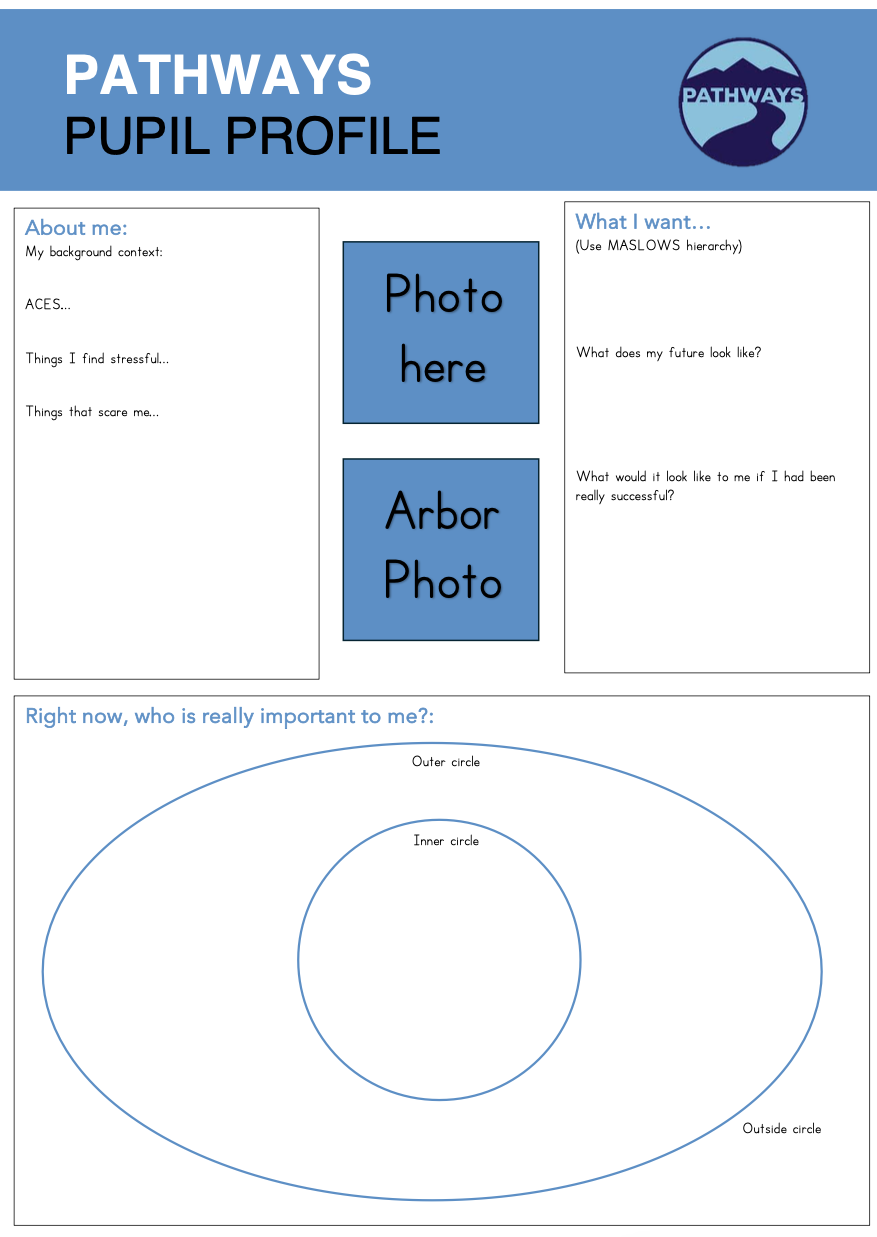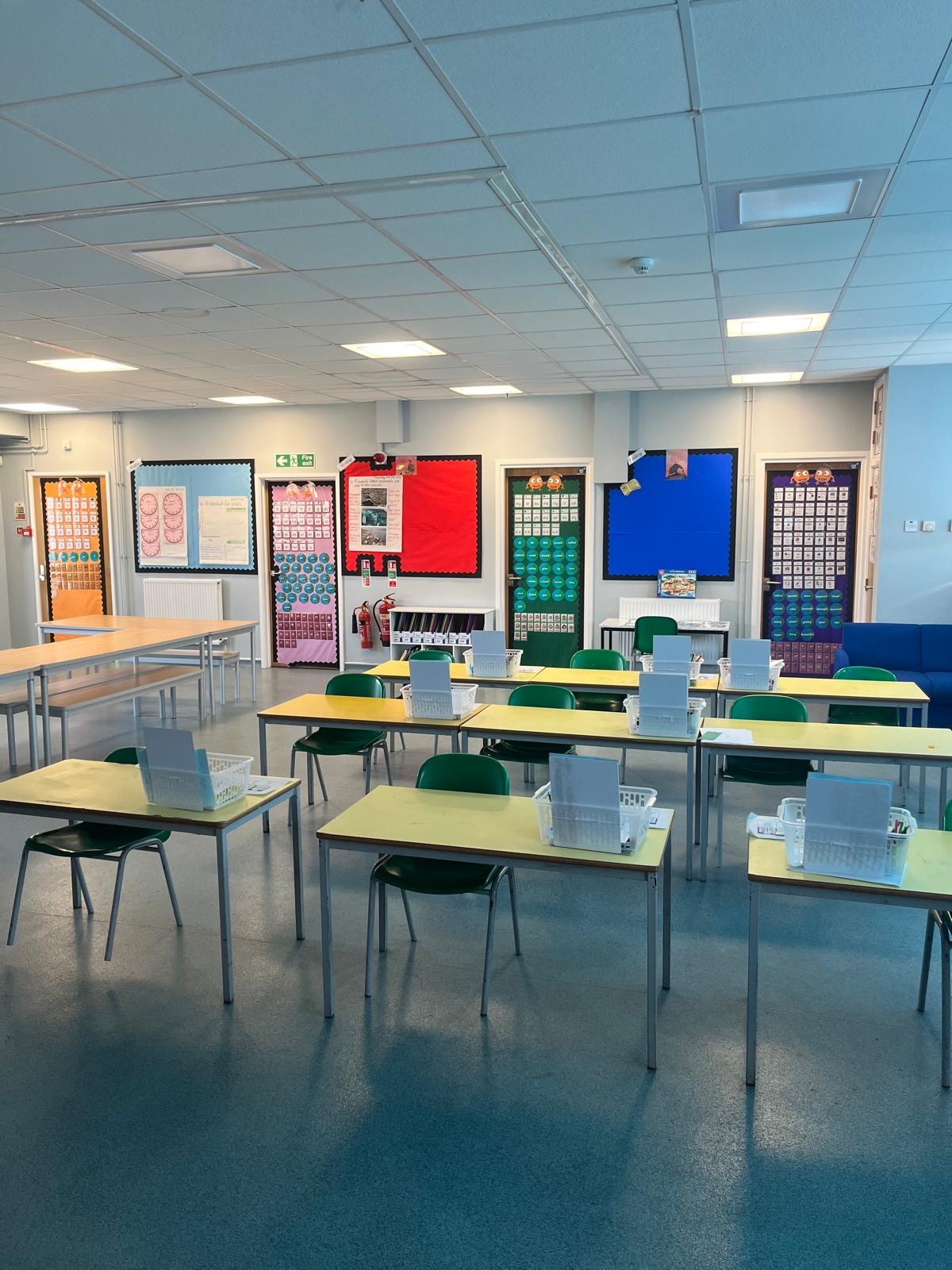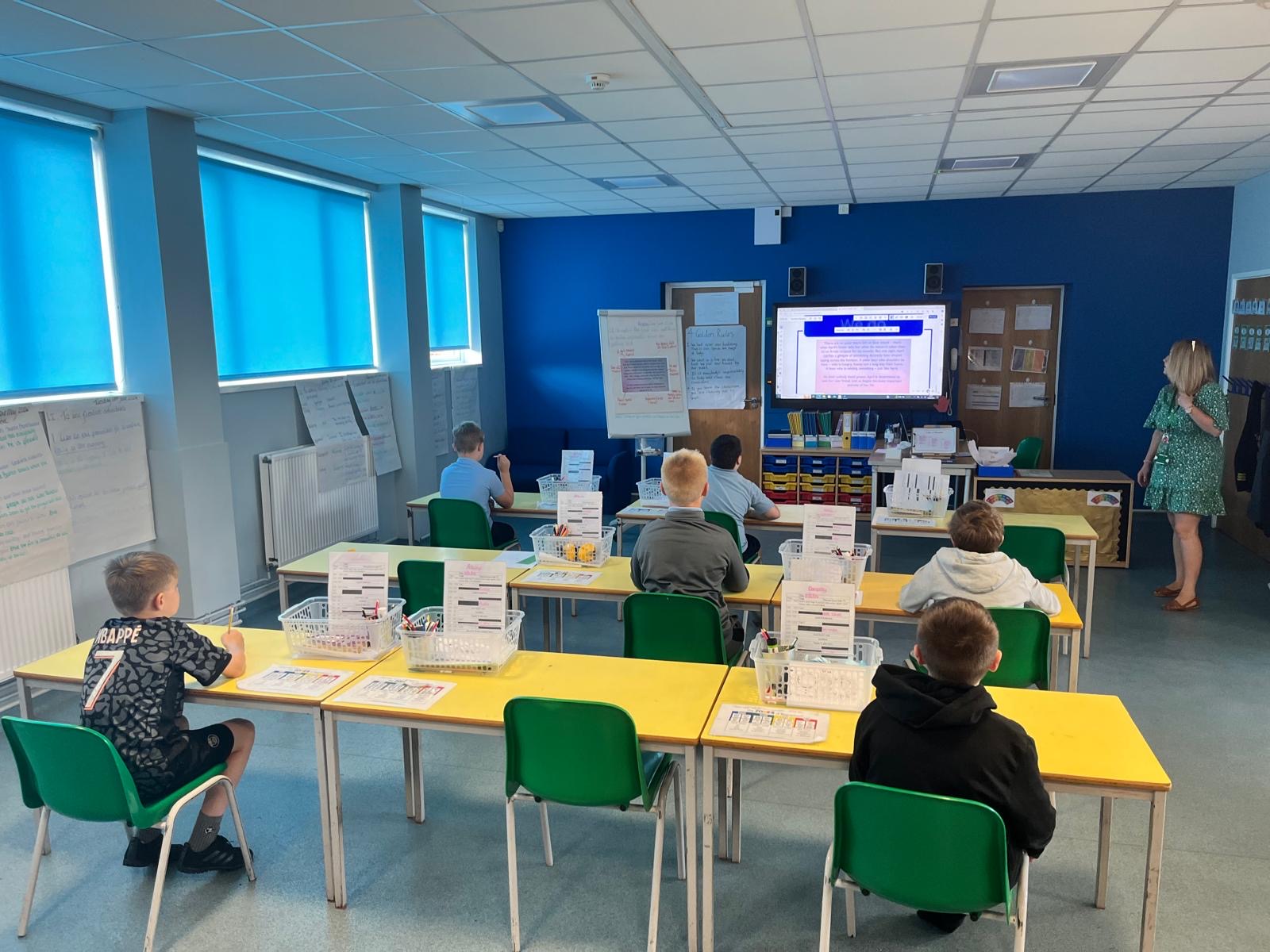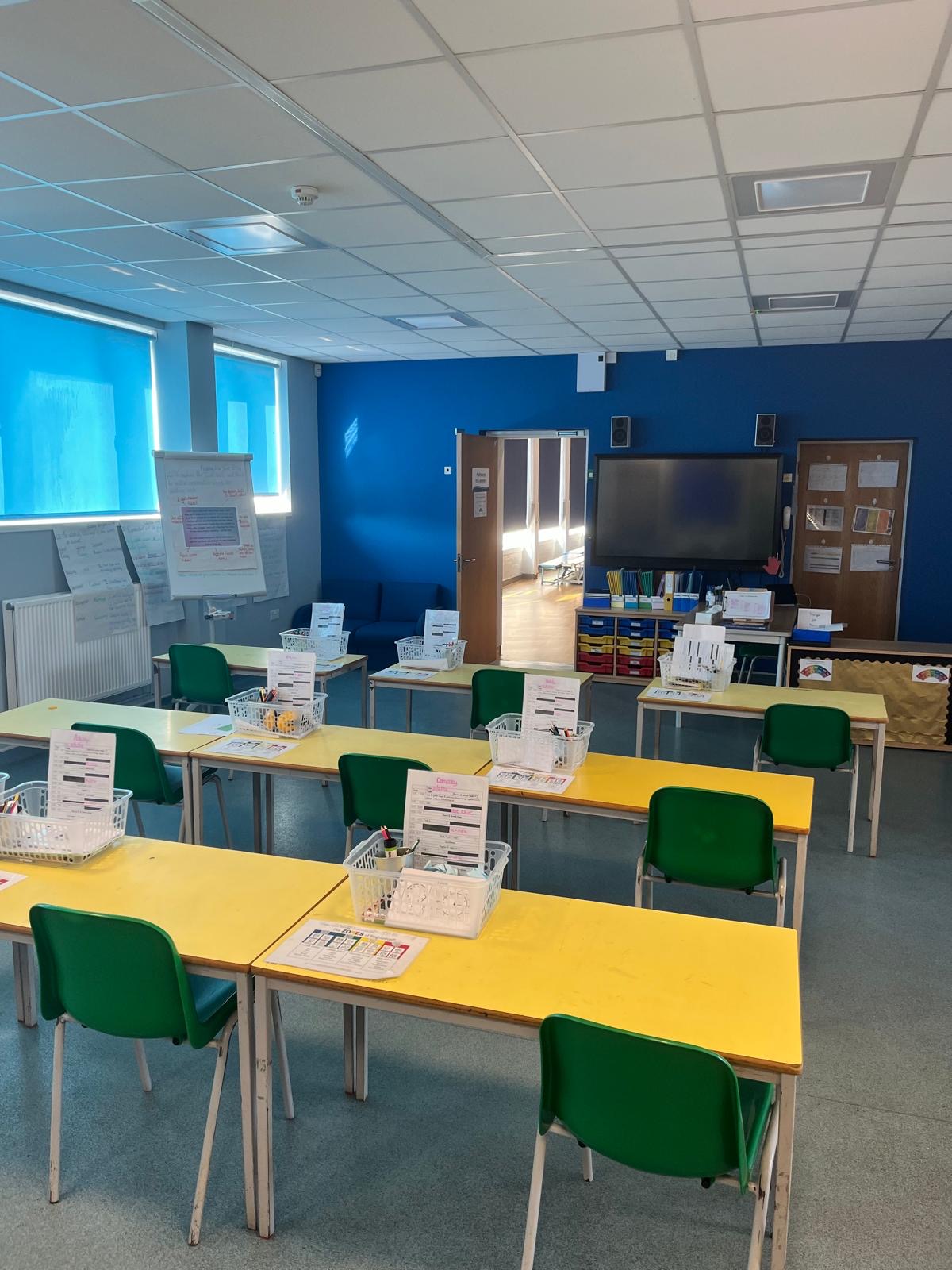Pathways to learning
WELCOME TO PATHWAYS!
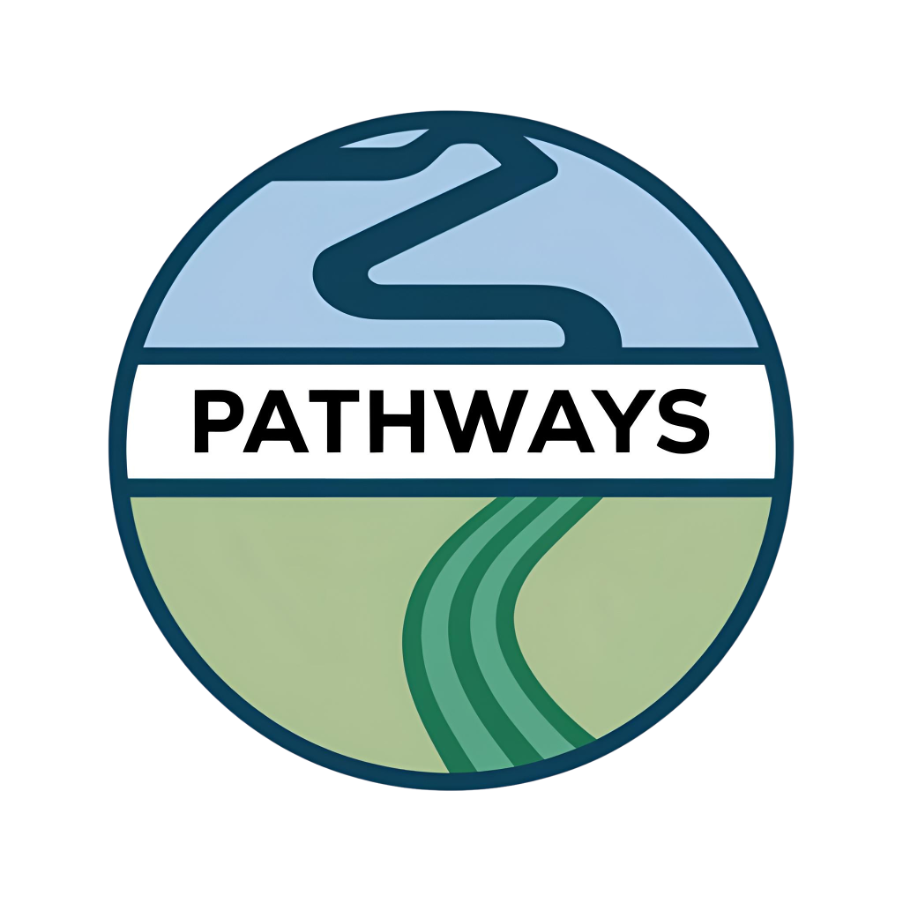
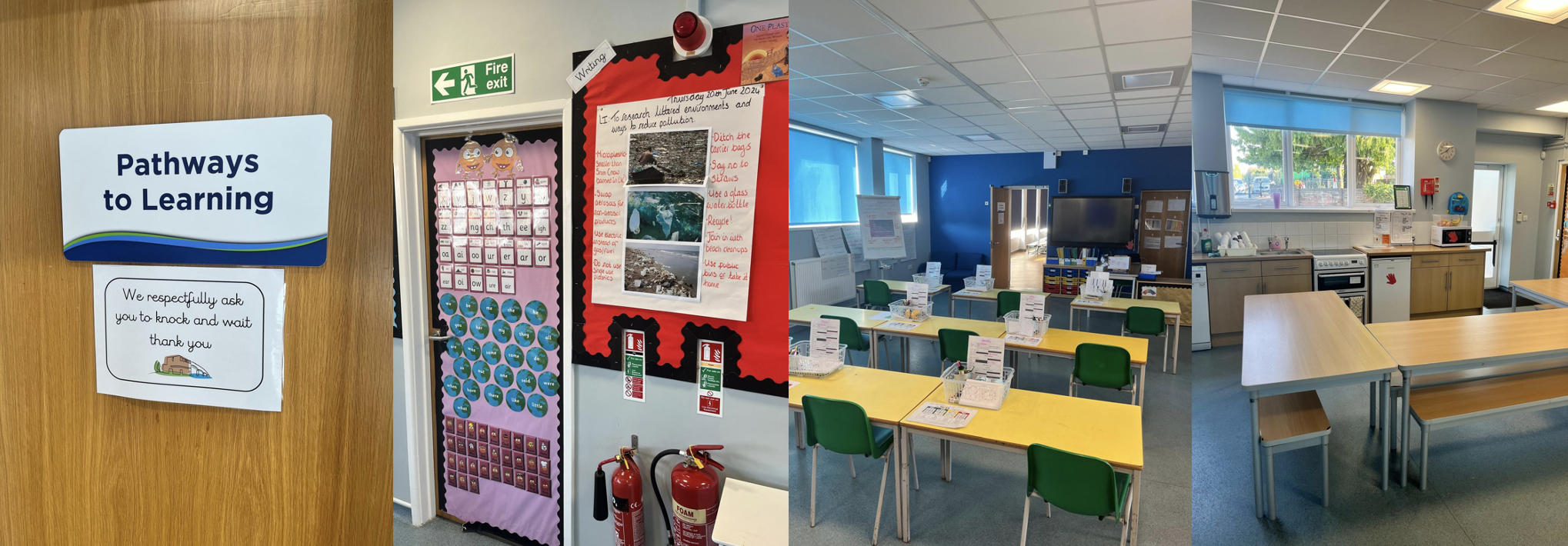
"Every child deserves a champion; an adult who will never give up on them, who understands the power of human connection and insists they become the best they can possibly be"
Rita Pierson
DEVELOPING AN INTERNAL ALTERNATIVE PROVISION
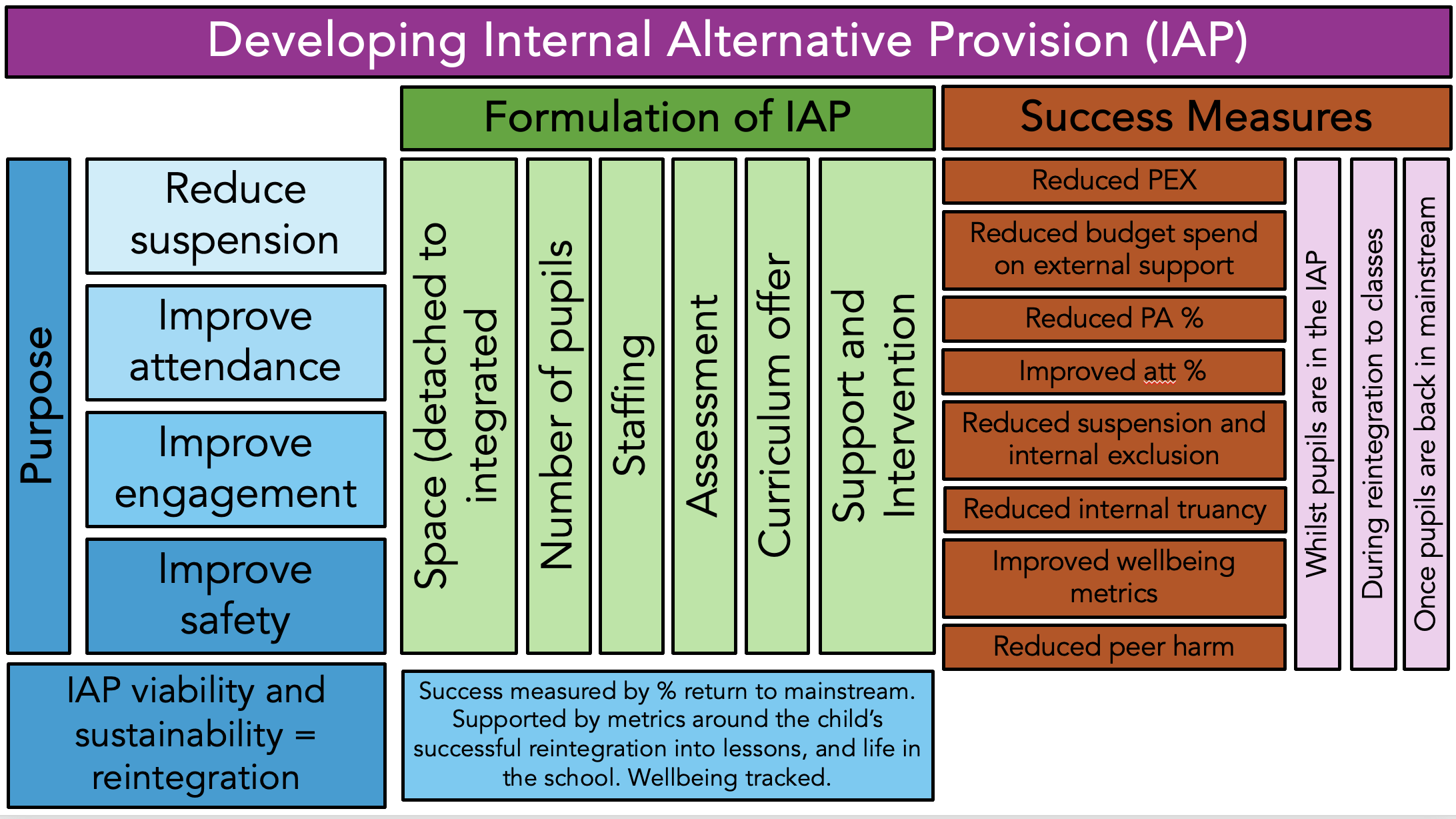
Over the last school year, we have needed to be responsive to the needs of pupils, for whom the mainstream school can sometimes be overwhelming, difficult to access and increasingly hard to feel successful in.
Suspensions at Valentine Primary School in 2022-23 were extremely high. Nationally, the rates are reaching crisis levels.
Developing our IAP 'Pathways to Learning' started with careful consideration of the children we needed to help the most. In conjunction with Southampton City Council's SEN Team (through Kirsty Relton) we started to look more closely at the child's profile to better understand the need and the support they require to be successful at our school.
Each child's profile needed to match the 'purpose' set out in the infographic that we created above. For some children, the 'purpose' is stronger in terms of a need to improve safety - because of external factors that impact learning. For others, improving suspension rates and ensuring continuity in relational practice is also important.
Pathways to learning
Aims of the provision:
1. Tailored Support for Pupils
- Personalised Learning: An internal AP allows for bespoke curriculum planning and tailored teaching approaches to meet the individual needs of pupils, especially those struggling with mainstream education.
- Focus on SEMH Needs: Pupils with social, emotional, and mental health (SEMH) challenges can receive targeted interventions in a safe and familiar environment.
- Early Intervention: Issues can be addressed promptly and effectively at an early stage, preventing escalation into more significant problems later in their educational journey.
2. Continuity of Relationships
- Familiarity with Staff: Pupils benefit from ongoing relationships with school staff who already understand their backgrounds, strengths, and needs.
- Sense of Belonging: Staying within their own school reduces feelings of exclusion and helps maintain their connection to the school community.
3. Reduced Exclusions
- Avoiding Permanent or Fixed-Term Exclusions: Internal AP provides a constructive alternative to exclusion, allowing children to remain engaged with learning rather than facing disruption in their education.
- Reintegration Pathways: It facilitates smoother reintegration into mainstream classes once pupils have made progress.
- Since September 2024 - suspensions have reduced by 78% at Valentine Primary School. A direct correlation to the opening of the provision.
4. Improved Outcomes
- Academic Progress: Tailored teaching can lead to improved academic outcomes for pupils who may otherwise fall behind.
- Behavioural Development: Targeted strategies and smaller group settings can help address behavioural challenges more effectively.
- Building Resilience: Focused work on emotional regulation and resilience can support long-term personal development.
5. Cost Effectiveness
- Reduction in External AP Costs: Providing an internal provision can reduce the reliance on expensive external providers.
- Maximising Resources: Existing staff, facilities, and expertise can be utilised effectively, often leading to better value for money.
OUR IAP - A LOVED ENVIRONMENT FOR CHILDREN WHO REQUIRE US TO RESPOND IN A DIFFERENT WAY
PREDICTABILITY IN THE LEARNING ENVIRONMENT
CALM, ORDERLY, WELL-NEEDRESOURCED
NEEDS BEING MET HOLISTICALLY and DEVELOPMENTALLY
What do we do?
Pupils at risk of permanent exclusion or requiring additional social, emotional and mental health support are referred to Pathways, a bespoke trauma-informed and nurture-based provision, staffed by knowledgeable and skilled professionals. Creating a sense of belonging in school ensures pupil motivation, improved academic achievement, reductions in absenteeism and other positive social outcomes including health and wellbeing.
Pathways to Learning at Valentine is an intervention focussing on the individual and what that individual needs to ensure they have the best possible life outcome and school career. We focus on readiness to learn and behaviour for learning, learning how to learn and shared attention skills are developed, with the aim that students can return to their year group classes successfully. Another key element of that we foster in Pathways is the development of pupil’s social, emotional, and behavioural communication.
HOW DOES IT WORK?
The provision provides respite from situations that maybe triggering/shameful and it will establish structure and routines in a supportive, nurturing and personalised way. On arrival, breakfast is integral to a soft start and wellbeing check-ins completed, enabling personalised timetable adjustments to be made.
Pathways to Learning is situated in the middle of the school but in a quiet location to allow the children to feel safe and secure. Pupils are referred via a referral process from the Inclusion Team, Year Groups Leads, Attendance and Safeguarding teams as well as working in collaboration with parents/carers, SLT and the wider professional network. Pupils access a bespoke timetable which includes our Lion Academy Trust Curriculum of Maths, Writing and Reading, as well as non-core subjects including, PSHE and RE. There are afternoon interventions to support pupils’ SEMH needs. These interventions include PATHS (Promoting Alternative Thinking Strategies), My Happy Mind, PE, forest schools, working Monty’s Hub staff as well as mindfulness activities. Staff support the children to understanding and recognise their emotions using The Zones of Regulation. Maslow’s Hierarchy of Needs is at the core of the support within Pathways to Learning. The CALM app is also used throughout the day to encourage mindfulness and calm.
REINTEGRATION TO MAINSTREAM
As children transition into Pathways, a detailed handover is completed between the Pathways team, the home class teacher and the year group lead. This ensures that the team know the child’s likes and dislikes as well as essential information to support them by building trusting connections. This also allows for academic and non-academic work to be differentiated appropriately allowing the child to feel success in their learning. Home class teachers and year group leads hold overall responsibility for the pupil and ensure that they keep regular contact to ensure that when the child is ready to transition back to main class, they still hold that bond and connection.
In collaboration with individual pupils their learning will be RAG rated enabling them to access main school lessons that are appropriate to their likes when they feel safe and secure enough to re-enter a mainstream classroom with their peers.
TIMETABLE FOR PATHWAYS
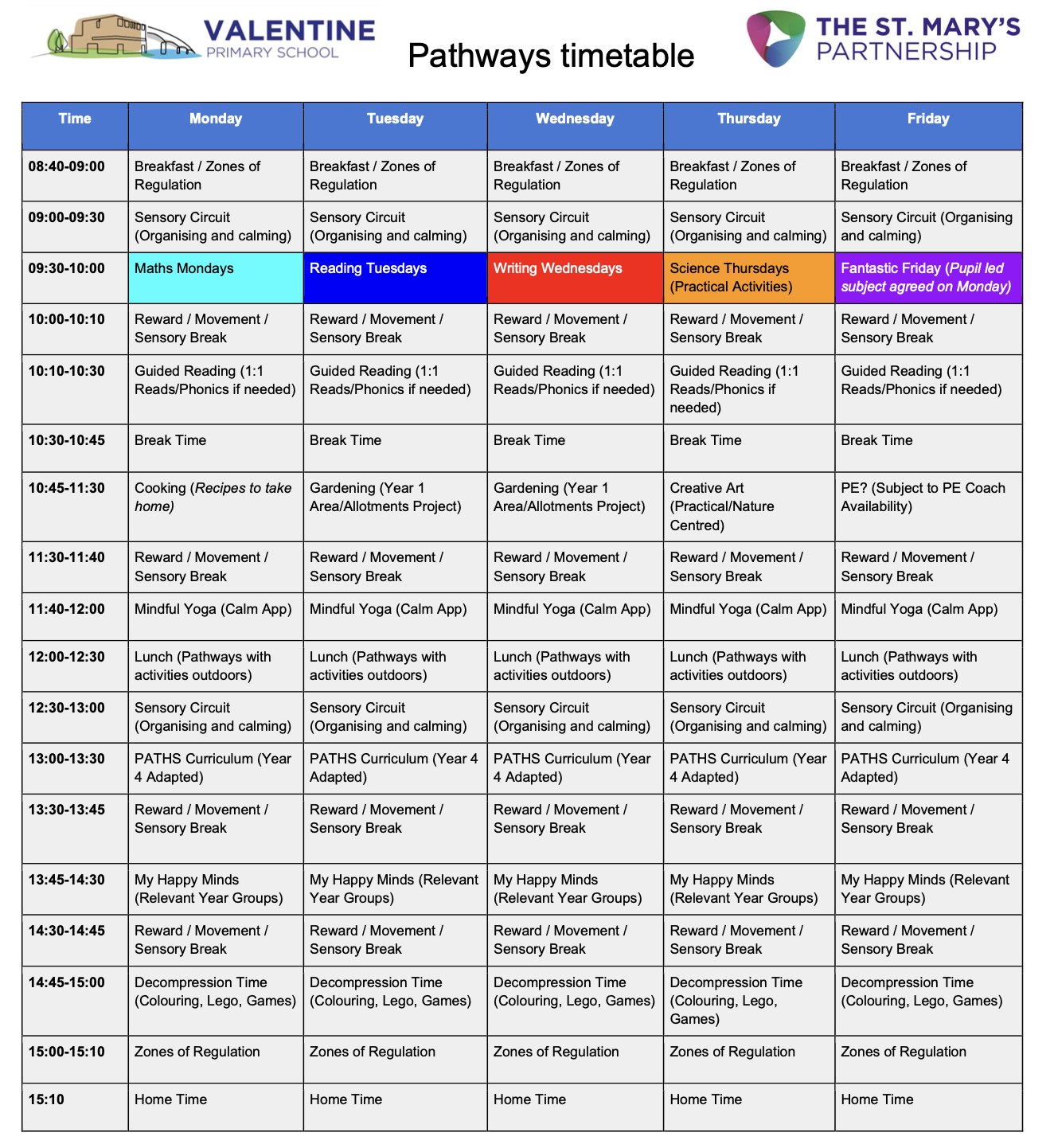
CURRICULUM FOCUS AND OUTLINE
The Pathway class in your child’s specialist provision focuses on "Securing the Fundamentals", which simply means making sure your child has a strong foundation in learning and emotional well-being before moving on to more advanced skills.
For children with Social, Emotional, and Mental Health (SEMH) needs, this approach is crucial because learning can feel overwhelming without the right support. Instead of rushing through a broad curriculum, we prioritise key areas—ensuring that your child truly understands and feels confident in fundamental skills before progressing.
How This Works for Your Child
The "Securing the Fundamentals" package is personalised to meet the needs of each child. Here’s how it helps:
-
Focused Learning in Maths and English
- Teachers use checklists, quizzes, and targeted support to identify exactly what your child needs help with.
- Small steps are taken to build confidence and mastery in essential skills (like reading, number work, and writing).
- Instead of overwhelming assessments, low-stakes quizzes help identify gaps without causing stress.
-
Emotional and Social Development
- Alongside academic support, we focus on your child’s well-being, confidence, and resilience.
- Daily activities encourage positive interactions, emotional expression, and self-regulation.
- This includes learning how to manage feelings, build friendships, and develop self-esteem.
-
Narrower Focus for Greater Success
- Many children with SEMH needs struggle when too much information is presented at once.
- The Pathway class slows down the pace and ensures that learning is deep and meaningful rather than rushed.
- We celebrate small victories, helping children feel accomplished at the end of each day.
Why This Approach Works for Children with SEMH Needs
- Reduces Anxiety: A calm and structured approach helps children feel safe and confident in their learning.
- Personalised Support: Learning is adjusted to meet your child's individual needs and strengths.
- Boosts Self-Esteem: Small, achievable steps help build pride and motivation.
- Prepares for the Future: By securing key skills and confidence, your child is better equipped for the next stage of learning and life.
Our ultimate goal is that every child arrives at school feeling welcomed and leaves feeling accomplished—ensuring they grow emotionally, socially, and academically at a pace that’s right for them.
Pupil profile in pathways
